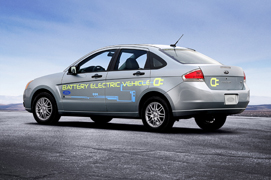
Ford will slowly ramp up its battery car efforts, starting with the Focus EV, shown here, and the battery version of the Transit Connect.
Ford Motor Co. plans a serious assault on the electric vehicle market, but the big push won’t come until 2012, the automaker says.
“Some” of the Detroit maker’s first electric vehicles will hit the road in 2011, Sue Cischke, the group vice president overcoming Ford’s sustainability efforts said. But the maker is taking a “slower entry” than it originally planned.
“We had always said 2011, which we’ll still do, but I think you’ll see more of the concentrated volume in 2012,” said Cischke, during a meeting with reporters in Washington, D.C.
The maker has indicated it has at least five battery-based vehicles in the pipeline – beyond the basic gas-electric hybrids, such as the Ford Escape Hybrid it now offers. First to market will be pure battery-electric versions of the Transit Connect van and the new-for-2011 Focus passenger car.
The battery Focus is expected to deliver around 100 miles of range on its lithium-ion battery packs, while the van will get 80. Ford expects the Focus EV to sell to fleet and retail customers while the Transit Connect EV is being pitched as a good solution for small businesses and other fleet users with fixed routes.
Beyond those two models, however, Ford has been coy about its plans, saying only that more battery-electric vehicles, or BEVs, could be mixed in with plug-in hybrid offerings. The latter would permit limited-range operation on battery power then switch to gasoline for longer trips, obviating so-called range anxiety problems.
Analysts and industry insiders continue to debate the potential demand for battery-based vehicles. Chevrolet originally projected initial sales of between 10,000 and 15,000 Volts annually, though it is now suggesting it may bump up production. Nissan has set a first-year target of 20,000 for the new Leaf BEV.
Ford, said Cischke, will target something between the Volt and Leaf volumes.
And the maker believes demand will likely be strongest in southern states – California and Texas are often seen as the critical new markets for battery vehicles. That reflects the physics of battery power, said Cischke. In northern climes, motorists will need to use their climate control systems more frequently. Electric vehicle heaters, in particular, are severe energy drains. In a Michigan winter, for example, a vehicle like Leaf or Volt could see battery range drop by as much as half.
Like other competitors, Cischke concluded, Ford is closely watching how GM markets its new Chevy Volt. “We’ll learn from what they are doing and how they market it,” she said.
